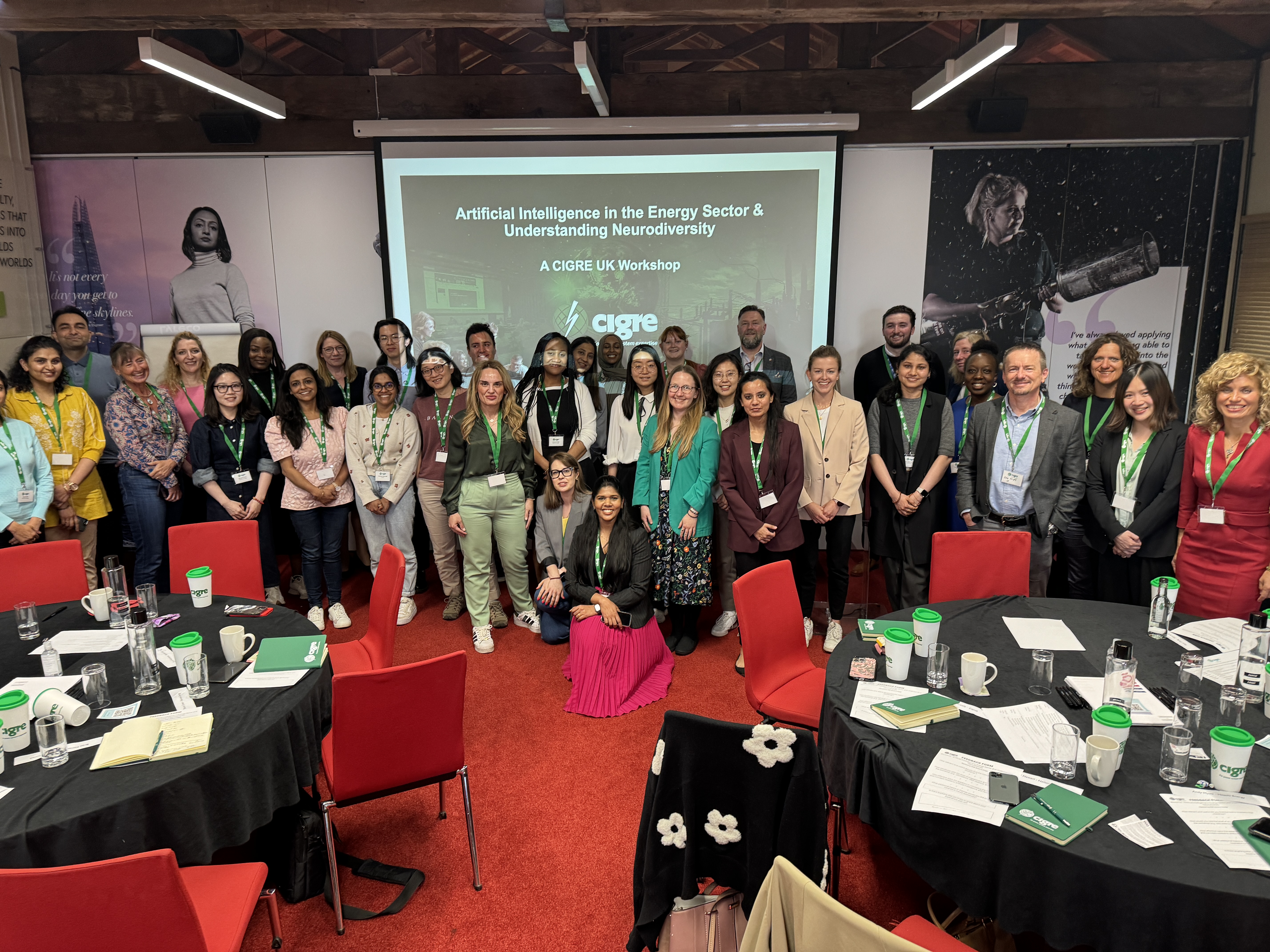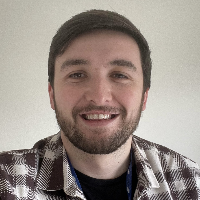
We’re thrilled to share the incredible outcome of CIGRE UK’s recent Women in Energy workshop, the first WiE in-person event in four years! This event brought together a diverse group of energy professionals from both industry and academia, fostering a vibrant space for knowledge exchange.
The workshop delved into the transformative role of Artificial Intelligence (AI) in the energy sector. Experts from National Grid, Open Climate Fix, and TNEI provided insightful talks on optimising operations, overcoming data challenges, and shaping the future of AI in energy.
Following this, the ADHD Foundation led an informative session on understanding neurodiversity – exploring how AI based apps can be leveraged to create a more inclusive work environment. The engaging panel discussion allowed attendees to interact with speakers and delve deeper into AI’s potential
This event was a resounding success! We received overwhelmingly positive feedback and witnessed high engagement throughout. A huge thank you to all the participants and speakers who made this possible.
Stay tuned for more updates and future events as we continue fostering collaboration and innovation within the energy sector!
To replay the presentations on AI in the Energy Sector click on the presentation videos below. Unfortunately, due to copyright issues the ADHD presentations are only available to those that took part in the event on the day (attendees will have received an email).
Presenter Biographies, Abstracts, Presentations & Videos
Anusha Srihari Arva

Job Title: Manager of Net Zero Strategy and Policy, Group Sustainability, National Grid
Presentation Title: The age of AI: UK’s first trials to develop fully automated overhead line inspection.
Download presentation.pdf: The Age of AI
Biography: Anusha is currently Net Zero Strategy and Policy Manager at National Grid. She is responsible for developing and implementing group-wide policy and strategy to support the delivery of environmental commitments at National Grid. Prior to this, she led an innovation portfolio on overhead lines at National Grid Electricity Transmission, aimed at evolving transmission overhead line assets into a net zero future. She also worked in applied research in France, on topics such as stability studies for integration of renewables and analysis of measurements taken from the European power grid. Prior to entering the energy industry, Anusha worked in Deloitte Consulting, honing her professional and consulting skills while working in the Information Management domain. Anusha holds a Bachelor of Engineering degree in Electrical & Electronics Engineering from The National Institute of Engineering (India) and a Masters in Control Engineering, Robotics and Applied Informatics, specializing in Control Systems from Centrale Nantes (France). Anusha is passionate about innovation, sustainability and STEM initiatives, and champions these in both professional and personal capacity.
Abstract: National Grid Electricity Transmission (NGET) owns approx. 22,000 steel lattice towers which, together with overhead line conductors, carry power across our electricity transmission network in England and Wales. These towers undergo structural deterioration through corrosion and require periodic visual assessment of their condition to plan interventions such as re-painting, partial or full replacements. We currently inspect around 3650 towers annually through helicopter surveys and manual assessment of captured imagery. This talk covers the enhancements we’ve made to our existing condition assessment practice through the Network Innovation Allowance (NIA) funded project: Visual Inspection and Condition Assessment Platform for OHL Steelwork (VICAP). This project trailed semi-autonomous drone flights for data capture along with Artificial Intelligence (AI) and Machine Learning (ML) for data processing and has successfully automated the condition assessment of steelwork on transmission towers. This unique meshing of cutting-edge technologies enables us to inspect our network in an optimal, safe and resource efficient manner while adapting our asset management practices to an ever-increasing tower fleet.
Peter Dudfield

Job Title: Head of Technology at Open Climate Fix
Presentation Title: Solar Nowcasting with Satellite Imagery using Machine Learning
Download presentation .pdf: Solar Nowcasting with Satellite Imagery using Machine Learning
Brief Biography: Peter is Head of Technology at Open Climate Fix, and where one of the main projects is to build a solar forecast for NG ESO. He started his career with Siemens Wind power mainly working on a ML image recognition project. He then joined Habitat Energy and helped bring over hundreds of MW of batteries into live market operations.
Abstract: Solar energy is predicted to be the largest form of power generation globally by 2040 and having accurate real-time forecasts is critical to anticipating power production. Unlike fossil fuels, renewable energies are unpredictable in terms of power generation from one hour to the next. In order to balance the grid, operators need an accurate daily estimate of when and how much PV and other renewable energies will be generated. Open Climate Fix (OCF) is an open-source (OS) AI company using machine learning (ML) to respond to the need for accurate renewable energy forecasts. Connecting energy industry practitioners with ML researchers doing cutting-edge modelling is our aim, and one way we seek to do this is by making much of our code open source (https://github.com/openclimatefix). In the energy space, OCF’s first focus is on solar nowcasting (short-term forecasting). Our main deep learning model takes in real-time PV data, numeric weather predictions, satellite images, as well as regional grid data, and outputs probabilistic solar electricity nowcasts for solar production systems in the UK. What makes our approach unique is teaching cloud dynamics to the model using satellite data. OCF’s 36-hour forecast, Quartz Solar, is currently used by National Grid, the UK grid operator, as a decision-making tool in their control room. Building on this forecast, we are working on a new open-source model, Quartz Solar OS, that we want everyone, not just grid operators, to be able to use.
Diptargha Chakravorty

Job Title: Head of Innovation at TNEI
Presentation Title: Bias Traps in AI
Download presentation .pdf: Bias Traps in AI
Brief Biography: Dr. Diptargha Chakravorty is a leading figure in the energy industry’s transition towards a more sustainable future. As Head of Innovation at TNEI, he leverages his experience of over 10 years as an electrical engineer to drive innovation and research. Dr Chakravorty has a distinguished record as a principal investigator in numerous projects. He fosters close collaboration with network operators, offshore wind developers, and government departments to translate research into real-world applications. Passionate about supporting the industry’s energy transition, Dr Chakravorty actively collaborates with universities across the UK and Europe. He is a thought leader who offers valuable guidance to policymakers through his participation in international working groups, including CIGRE, the International Smart Grid Actions Network, and the Global Power System Transformation Consortium.
Abstract: AI automation holds immense potential to streamline processes, improve efficiency, and enhance our lives. However, it also raises a host of ethical concerns that must be understood and carefully addressed such as Bias and Fairness. Bias in algorithms and models, or in the input data, can perpetuate through the process, leading to unintentional but discriminatory outcomes. The goal of this presentation is to introduce the challenges associated with data driven methods and discuss the principles and mitigation methods for developing fair and accountable algorithms.
Arron Hutchinson

Job Title: Education Training Director at ADHD Foundation
Brief Introduction about ADHD Foundation: The ADHD Foundation is the leading UK charity for neurodiversity, dedicated to supporting those with conditions like ADHD, Autism, and Dyslexia throughout their lives. It aims to improve life opportunities by advocating for social change, removing barriers in health, education, and employment for neurodiverse people. Embracing a vision where neurodiversity is seen as a strength, the Foundation champions a strength-based approach, recognizing the talents and employability of the neurodiverse while addressing potential disadvantages.
Brief Biography: Arron Hutchinson is the Education Training Director for the ADHD Foundation – The Neurodiversity Charity. Following a five-year teaching career, Arron joined the ADHD Foundation to deliver high-quality CPD for educational professionals on how best to support neurodiverse children and young people in the classroom. Arron’s work also includes the delivery of therapeutic interventions for children and young people with a variety of needs, whether they have a diagnosis or not.
